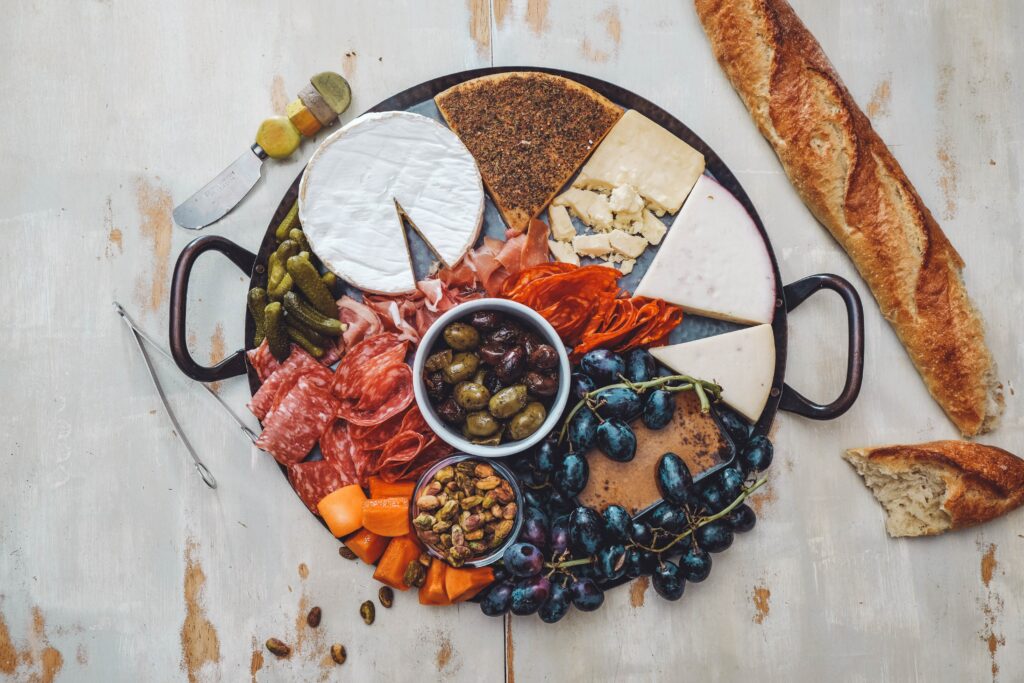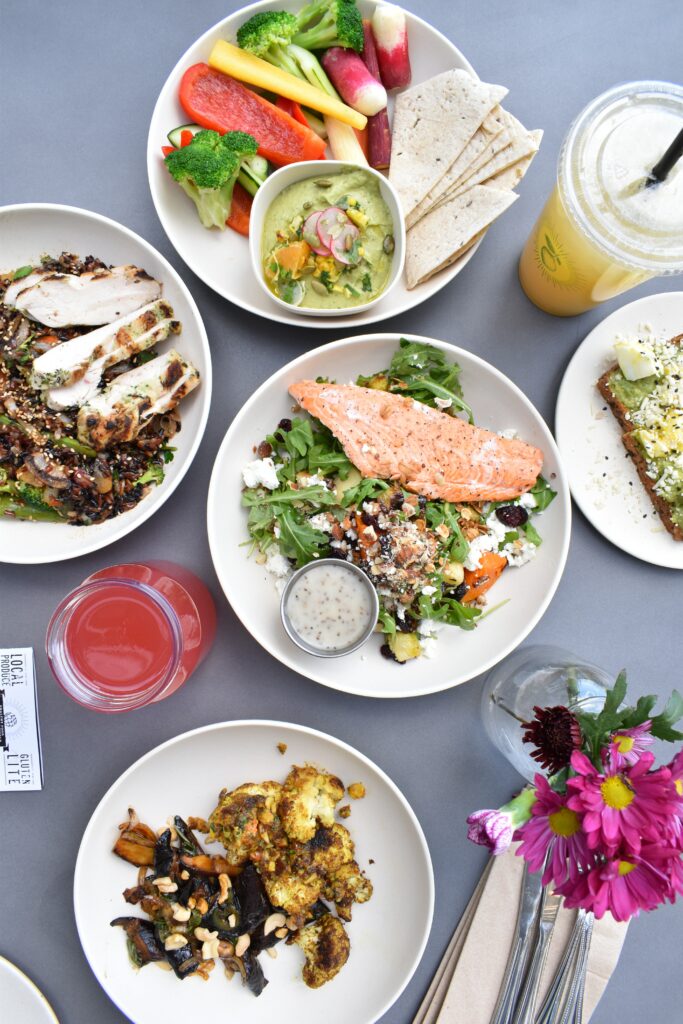Happy 2024! Rather than hop on the same dieting bandwagon this month, let’s flip the script. It’s time to take a more practical, sustainable, and feel-good approach—a way of eating that nourishes without deprivation or restriction. With that in mind, today I’m sharing how to avoid diet culture. Ultimately, by learning how to tune into your body’s needs, while balancing blood sugar, there’s no need to count calories or remove entire food groups. To kickstart January on a positive note, let’s say sayonara to diet culture (once and for all).

Why I’m not anti-fat loss
First thing’s first: while I am anti-diet culture, I’m not anti-fat loss. Yes, I believe these two things can co-exist. Under certain circumstances, losing body fat might be an important and vital goal. For some, weight loss is a piece to their health puzzle. For example, if your body is inflamed and your heart health is declining, carrying excess weight negatively impacts the quality (and length!) of life. That said, weight loss can be a slippery slope. Ultimately, losing fat should be for the right reasons: better sleep, a stronger body, improved fertility, balanced hormones, lower risk of chronic disease, more energy, reduced joint pain, etc.
If losing weight is purely for aesthetic reasons—or to accredit body dysmorphia—weight loss will not improve your health. Believe you’re focused on weight loss for unhealthy reasons? Consider NEDA’s supportive team and resources.

january: a Hot bed for diet culture
It’s restrictive, tedious, and doesn’t spark joy—these are just a few reasons why a new year’s diet isn’t worth the endeavor. In many ways, January is a hot bed for diet culture. With holiday indulgences behind us, the new year beckons a huge marketing opportunity. We’re sold the promise that a particular product, diet, or exercise regime will make us thin, beautiful, and above all, happy. While some advocate for ditching carbohydrates, others encourage eliminating gluten, reducing fat, decreasing sugar, cutting dairy, or swapping meat for plants. The list is endless. Ultimately, you want to find a sustainable approach to eating—one that makes you feel your best. Below are a few tips to help keep your mind healthy and kiss diet culture in January goodbye.

there’s no quick fix
Spoiler alert: no juice cleanse will mold you into your healthiest body. Instead, you want to prioritize your body’s natural set point. In essence, this is a range of 5-20 pounds where your body thrives. Within this range, you’re honoring your hunger cues, moving your body in a moderate way, getting quality sleep, and menstruating. Most importantly, you feel good. However, there’s no quick fix to finding your body’s set point. Through trial and error—and without extreme regimes—you can land in your body’s natural set point. Eventually, tuning into your body’s natural cues for what, when, and how much to eat will lead you to your set point. I highly recommend this book to get started.

CONNECT WITH YOUR NATURAL APPETITE
Between headlines spouting fad diets, to social media celebs touting misinformation, it’s easy to get confused by what’s best for you and your body. Thus, it’s easy to mistrust your appetite. Especially as women, we’ve been taught to disregard it. Read somewhere that fasting is key? Heard that eating after dark causes weight gain? All of these messages are stress-inducing (and likely, don’t apply to you, specifically). If you’re not sure how much to eat, when to eat, and what to eat, you’re not alone. If you think you exhibit signs of not eating enough, it’s time to crowd out the unnecessary noise and reconnect with your body’s natural appetite.

THE POWER OF INTUITIVE EATING
Rather than count calories this year—an exhaustive, impractical task—consider a more balanced approach. Hello, intuitive eating. This style of eating makes you the expert of your body and its hunger signals. It doesn’t impose guidelines on what to avoid or when to eat. Instead, it teaches you that you are the best person (the only person!) to make those choices. Rather than hop on the latest diet trend or mimic your favorite influencer’s style of eating, get back to the basics. Where to begin? During the day, start by eating a balanced meal every 3-4 hours. This helps keep blood sugar balanced. Another helpful tip: enjoy a protein-forward breakfast. This will help support healthy hormones, energy, and metabolism.
No need to give up foods you love
At some point, refined grains, sugar, saturated fat, dairy products, gluten, meat, high-sugar fruits, white potatoes, etc. have all been vilified. Claims have been made that any of all of these foods will make you overweight, unhappy, infertile, and even sick. Unless you have genuine medical or ethical reasons for eliminating certain ingredients, there’s no need to give up foods you love. While there may be more nutrient-dense options for certain foods, restricting yourself in the name of someone else’s health ideals is nonsense. You are old enough and wise enough to know what (and what doesn’t) make you feel fueled and satisfied. You do you.

try to eat seasonally, if possible
If you’re craving a leafy green salad in January, go for it! But for most of us, we’re in the depths of winter and cold veggies aren’t the most palatable. Post-Christmas is cold and dark, and unlike diet culture tries to promote, now isn’t exactly the time to be eating raw, leafy greens and crisp tomatoes. January is the time to enjoy warming, grounding food. Think: stewed apples or pears in coconut oil and cinnamon, clementines and a handful of walnuts, charred beets and Brussels sprouts, ginger tea, roasted turkey, and bone broth. These are all in season right now. When possible, opt for soups, stews, and veggie-packed casseroles to aid in comfort and satiation.

Focus on blood sugar balance
Last but not least, let’s talk about blood sugar balance. When it comes to taking practical care of your body in the new year, consider prioritizing stable blood sugar. After all, it’s the golden ticket to hormone health, a robust metabolism, longevity, and much more. Rather than fall victim to diet culture’s messages in January, opt for learning the ins-and-outs of blood sugar. See here for easy tips to master your blood sugar!
COMMIT TO MOVEMENT
Taking a walk (20 minutes is great!) after a meal can decrease a meal’s impact on your blood sugar levels. Exercise, in general, is instrumental for blood sugar management.
LOWER STRESS
Your stress hormone, cortisol, is linked to blood sugar. Increased stress increases your blood sugar levels. See here for three tips to lower your daily stress.
PRIORITIZE SLEEP
Sleep deprivation is associated with higher blood sugar levels (and cravings). The correlation is fascinating. Aim to get into bed 15 minutes earlier tonight, and be sure to limit screen time once you near bedtime (ideally 30 minutes to one hour before bed).
WEAR A CONTINUOUS GLUCOSE MONITOR
Want to get personalized data on your blood sugar levels (in real time)? Wear a continuous glucose monitor, like Levels or Nutrisense, to measure your personal fluctuations throughout the day. Especially if you’re motivated by data, you’ll love wearing a CGM. In just one month, you’ll learn how to optimize your metabolic health!
This article is for informational purposes only. It is not, nor is it intended to be, a substitute for professional medical advice, diagnosis, or treatment and we recommend that you always consult with your healthcare provider.



Leave a Reply